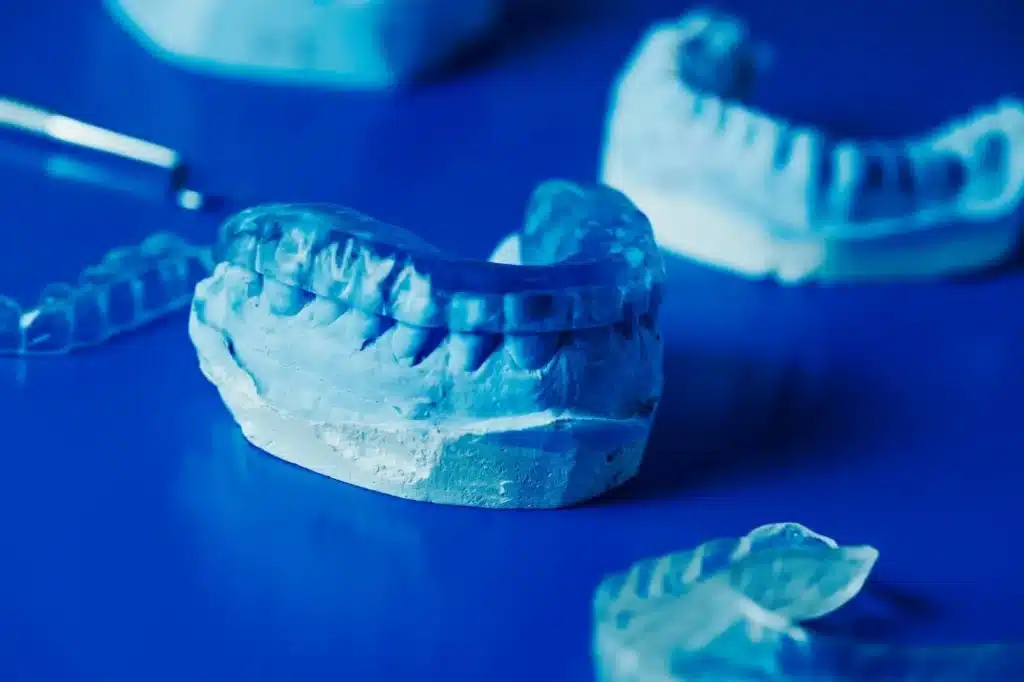If you have severe bruxism, then nightguards are the solution to protect your teeth. Read more to know the different types of nightguards.
What is a Nightguard?
A nightguard is like a special mouth protector. People use it when they have a problem called bruxism, which is when they grind or clench their teeth, often at night. This can hurt their teeth and make it hard to sleep. It can also happen during the day, but you notice it and can stop yourself.
Who needs a Nightguard?
People who grind or clench their teeth should use a night guard, especially at night. Grinding your teeth is bad for them; a night guard helps stop that. It’s a way to avoid needing dental work later on. You can contact us for information if you want to know more or get one.
Types
You can use different nightguards to protect your teeth while sleeping. When choosing one, you should consider how bad your teeth grinding is, what the nightguard is made of, and other stuff. Talking to your dentist about which is right for you is a good idea.
Over-the-counter (OTC) Nightguards
You can buy the OTC nightguards in regular stores. They’re usually not made from strong materials, so they’re cheaper. These are designed to fit most people but might not be very comfortable.
You can mold these to fit your teeth better by heating and biting them. They’re more custom, but not as good as a genuinely custom-made one.
Custom-made Nightguards
Professionals make these and fit your mouth perfectly. There are three types of custom-made nightguards:
- Soft: These are made from soft plastic and are good if you grind your teeth lightly. They’re flexible but might only last briefly because some people bite down on them too hard.
- Hard: Hard nightguards are made from tough plastic for people who grind their teeth hard. They’re not as flexible, but they last longer. You might need adjustments if your dental work changes.
- Dual laminated: These combine the benefits of both soft and hard guards. They have a soft inside and a tough outer shell, providing comfort and durability.
Thermoplastic Nightguards
These are special because you can adjust them yourself. You soften them in hot water, then put them on your teeth. They mold perfectly to your teeth, which makes them comfy. They’re also safe and don’t cause allergies.
Materials
A nightguard is typically made from safe and approved materials like plastic or acrylic, which are either hard or soft, depending on the type.

What to Consider When Choosing A Nightguard
When you’re picking between a nightguard for your top or bottom teeth, think about these things:
Comfort
You want your nightguard to be comfy because you’ll have it in your mouth all night. If you grind your teeth during the day without noticing, a lower nightguard is a good choice because it’s less noticeable. It’s also better if you have a sensitive gag reflex. But keep in mind that upper nightguards are usually bigger and bulkier.

Teeth Condition
Your teeth condition matters, too. If you get a custom-made nightguard, it’s made to fit your teeth. So, if you have a lot of missing or crooked teeth on one set, it’s better to pick the set with healthier teeth for a better fit.
Pros and Cons
Using a nightguard has excellent and not-so-good sides, so it’s wise to talk to a dentist to find the best one.
Pros of Using Nightguards:
- It stops your teeth from getting more damaged.
- If you grind your teeth, it can help you sleep better.
- It feels comfy for your teeth.
- It can help with jaw, crooked bites, and other dental problems.
Disadvantages of using a nightguard:
- They can be expensive.
- Some types can get loose or break easily.
- Some people might drool or have a dry mouth, especially when using one.
Conclusion
Hope now you are aware of the importance of wearing a nightguard. Always consult your dentist when choosing a nightguard. It protects your teeth from damage and maintains your oral health. Contact Dentalsway for more details on the benefits of wearing nightguards.


